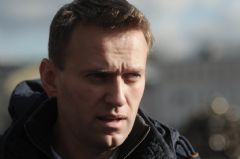Human Rights Voices
While the UN devotes its human rights operations to the demonization of the democratic state of Israel above all others and condemns the United States more often than the vast majority of non-democracies around the world, the voices of real victims around the world must be heard.
Russian Federation, July 28, 2019
Vladimir Putin critic Alexey Navalny hospitalized with suspected poisoning, doctor says
Original source
A doctor for Russia's most prominent opposition leader, Alexey Navalny, has suggested the activist has been poisoned after he was hospitalized Sunday after falling mysteriously ill in a Moscow jail.
Navalny was taken by ambulance to the hospital early on Sunday morning from the jail with what authorities said was a "severe allergic reaction," his spokeswoman Kira Yarmysh wrote on Twitter. Initially, one of Navalny's close colleagues suggested the cause was likely unsanitary conditions in the jail, but by the evening Navalny's lawyer released a statement from his long-time doctor saying that his symptoms were the result of "an undefined chemical substance."
In the statement posted to Facebook by the doctor, Anastasia Vasilyeva, along with a second doctor, Yaroslav Ashikhmin, said that hospital authorities had prevented them from properly visiting Navalny but he had been able to examine him through a window of the ward's door.
According to the statement, Navalny has swelling on and around his eyes, with puss leaking from his right eye. He also has a skin rash over his neck, back, chest and in his elbow.
"This is the result of the harmful effect of an unidentified chemical substance," the statement posted by Vasilyeva said. The doctors noted that none of the five other inmates in Navalny's cell had fallen ill and that Navalny has no allergies and has never previously suffered an allergic reaction.
"We cannot exclude toxic harm to the skin and mucous by an unknown chemical substance with the help of a certain 'third person'," the doctors wrote in the statement, demanding that authorities take samples from Navalny and his bedding in the jail to test for toxins.
They also accused hospital authorities of deliberately preventing Navalny's doctors from examining him. "Why? Obviously so that nobody discovers and nobody guesses about the reason for Alexey Navalny's 'illness,'" the statement said.
Vasilyeva is an eye-doctor, who treated Navalny in 2017 when he almost lost his eye after a pro-Kremlin activist threw disinfectant in his face. Ashikhmin is identified in the statement as a physician, cardiologist and a specialist in differential diagnosis. In the post, Vasilyeva wrote she was concerned that the swelling on Navalny's eyes now could cause new damage and pose a threat to his sight.
Navalny, 43, is currently serving a 30-day jail sentence after he was arrested this week ahead of an opposition demonstration on Saturday that he had helped organize to demand opposition candidates be allowed to take part in local Moscow elections. The protest went ahead in Moscow on Saturday and saw Russian police arrest over 1,300 people in a crackdown by authorities that saw protesters beaten by heavily-armored riot police and raids on the homes of key opposition activists before it started.
Fears that Navalny could have been poisoned quickly emerged after he was hospitalized because numerous others critics of President Vladimir Putin have been over the years, from pro-democracy activists to the former Russian intelligence officer Sergey Skripal, targeted with a nerve agent in the U.K. last year.
Last year, Peter Verzilov, a well-known activist from the protest group, Pussy Riot, was flown to Germany in critical condition for treatment after suffering what doctors said was almost certainly poisoning.
A lawyer who has gained a size-able following with his investigations into alleged corruption by officials and his calls for fair elections, Navalny has become the Kremlin's most troublesome opponent, recently leading some of the largest street protests Russia has seen in years. While he has been frequently harassed by pro-Kremlin activists and pursued with criminal cases that he says are meant to stop his activism, it has long been a question among his supporters and other observers why he has not been targeted with assassination as other key Putin critics have.
Following the doctor's statement that Navalny was likely poisoned, a small group of his supporters gathered outside the hospital where he is being treated. Police detained at least 20 people there, according to a live broadcast by TV Rain, whose reporter was also detained there.
Earlier on Sunday, one of Navalny's top lieutenants, Leonid Volkov, initially suggested Navalny's illness was the result of dirty conditions in the prison, writing on Twitter that he had also been kept in the same cell where Navalny was during a recent 28-day detention, and had emerged with a similar skin rash. He later, however, re-tweeted the doctor's statement.
If confirmed, Navalny's poisoning will send fresh shockwaves through Russia's opposition, coming immediately after the crackdown on the protest this week. Saturday's demonstration was prompted after election authorities refused to register several prominent opposition candidates to take part in the Moscow city council election this September. The move touched off unusual anger among the city's liberal society, who see it as a sign the Kremlin will now not tolerate even low-level legal political opposition.
The aggressive response to Saturday's protest, that saw several key opposition leaders arrested either before or during the demonstration, has been taken by many as an indication authorities are embarking on a deeper crackdown on the country's opposition.
By Sunday, over 1,300 people had been detained, according to OVD-Info, a group that monitors arrests -- a record number of detentions at a protest in Russia. It surpassed the number arrested during the mass demonstrations that broke out against Putin in 2011 and 2012, when fabricated election results prompted over 100,000 people to take to the streets.

